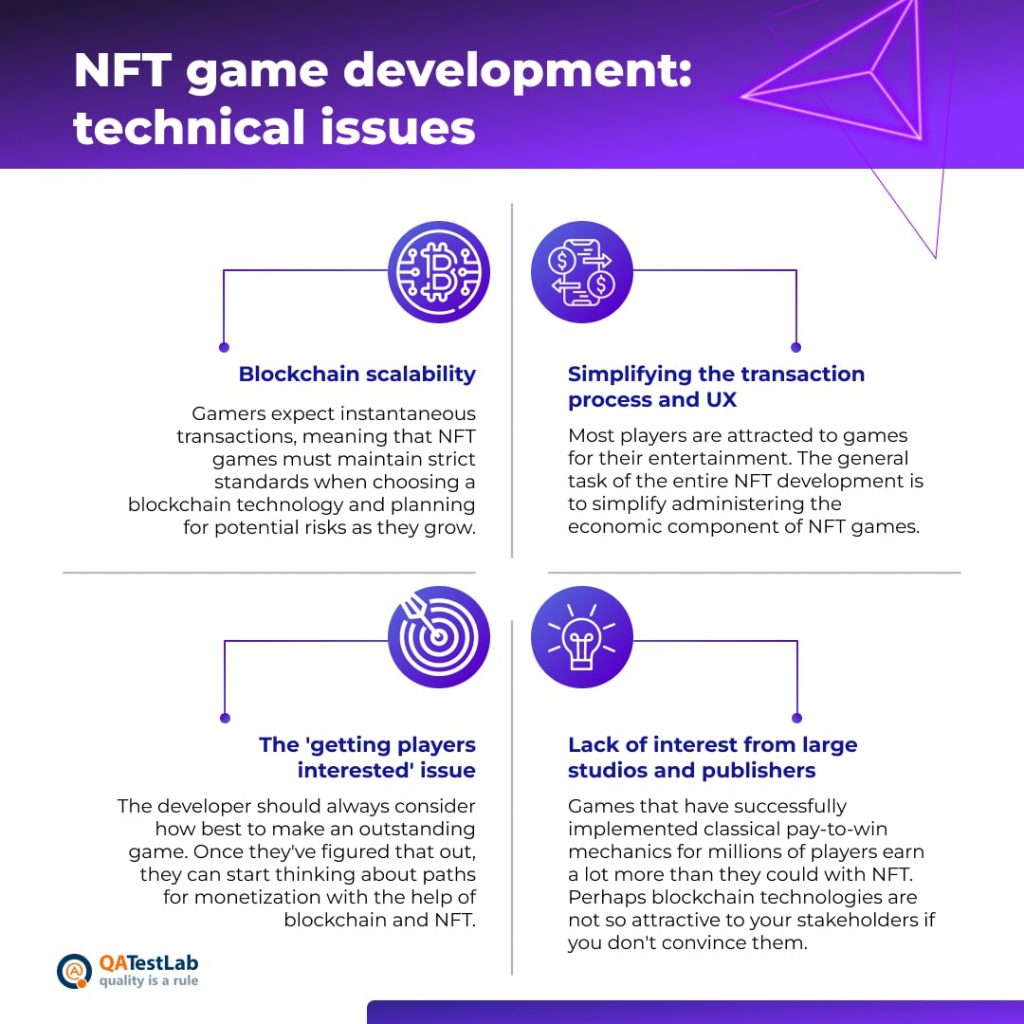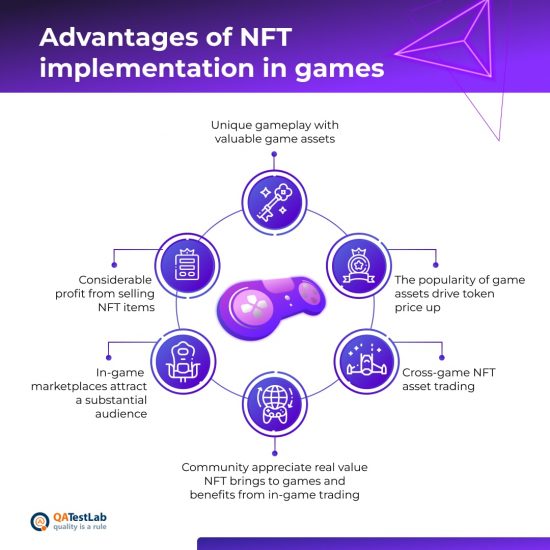The Secret of NFT Games Popularity: Features and Benefits
by Yanina Shabanova | July 13, 2022 5:36 am
NFT games have caused a lot of buzz in the crypto and blockchain areas. A new technology ahead of the digital decade has enormous potential to change the entire gaming industry. You can’t argue with the numbers: over a million players play the top ten NFT games[1] every week. Just consider that the total trading volume of just one game, Axie Infinity, exceeded $1.5 billion in the summer of 2021[2].
What attracts developers and players in this modern technology? Let’s analyze the main advantages that draw millions of people.
What is NFT?
NFT (non-fungible token) is a unique digital certificate stored on the blockchain. It guarantees the item’s originality and confirms the owner’s exclusive rights.
This concept comes from the world of cryptocurrencies and uses the same blockchain technology[3]. However, unlike other tokens, NFTs cannot be changed, split, or swapped invisibly. This system best secures the rights to a unique object[4] — a work of art, real estate, and, of course, an artifact in a computer game.
By purchasing an NFT token, the user receives a certificate for a specific item. At the same time, this element does not move anywhere and is located in unlimited storage, also known as the Interplanetary File System (IPFS). Essentially, this certificate consists of lines of code that authenticate the token’s owner as the proprietor of the original version of the element or object.
How do NFT games work?
NFT games incorporate NFTs into the game’s rules, mechanisms, and player interactions. For example, in such a game, a unique character, avatar or virtual items such as weapons may be NFTs.
Players can exchange or trade NFTs with other players to make a profit. The new model in NFT games, the “play to earn”, offers players a way to earn money from NFT games.

What are the main features and benefits of NFT games?
Entertainment with added value
Let’s start with the big one. NFTs in games can add value to an already tried and tested gaming experience. The use of NFTs means players can be the sole owner of an in-game item and then choose between trading, selling, or keeping. The idea that players can make money in the game is not new, but NFTs are safer and more flexible.
Cross-game compatibility
The NFT collectible can be used in many or all games. NFT is stored on the blockchain; its data and ownership are traceable and corruption-proof, meaning it can be easily transferred between games using the same blockchain.
High level of protection
Unlike traditional games, NFT gaming platforms exist on a blockchain network independent of any particular gaming platform. Thus, the player’s property is securely protected in the hands of the player himself, regardless of the gaming platforms.
Transparency of financial transactions
All transactions made by players are stored in a shared blockchain ledger. Therefore, fraud in the purchase of a gaming accessory is not possible.
Liquidity of assets
Since the platform is decentralized without any restrictions, every user will have the right to convert their gaming assets into real-world money easily.
Crowdfunding and investments
The NFT platform allows independent developers to fund their games by offering pre-sale in-game items as NFTs. It means that users can choose an indie game, help fund it, and own a piece of the product.
Theoretically, players can become investors and own part of the game in the form of NFTs. Like so much else in the new world of NFT, it will take a bit of love for UX to take off and be transparent about the risks. But NFTs could represent a whole new level of crowdfunding.

Conclusion
Numerous top NFT game developers have picked up and implemented the NFT gaming trend that offers an immersive and sensational experience with crypto collectibles. Inspired by gaming trends, our team of testers supports the course towards blockchain products and is ready to help with testing such games. If you have a request for testing NFT games, please write to us[5], and we will help you create a unique and popular gaming product.
Learn more from QATestLab
Related Posts:
- a million players play the top ten NFT games: https://www.statista.com/statistics/1266486/blockchain-games-user-number/
- Axie Infinity, exceeded $1.5 billion in the summer of 2021: https://www.covalenthq.com/blog/axie-part-two/
- blockchain technology: https://blog.qatestlab.com/2020/08/04/blockchain-testing-in-2020/?utm_source=blog&utm_medium=article&utm_campaign=nft-games-features-13072022
- a unique object: https://www.cryptohopper.com/blog/4112-top-use-cases-of-non-fungible-tokens-nft
- write to us: https://qatestlab.com/request-a-quote/?utm_source=blog&utm_medium=article&utm_campaign=nft-games-features-13072022
- Updates Without Mistakes: Regression Testing in Game Development: https://blog.qatestlab.com/2022/08/30/game_regression_testing/
- How to develop a crypto game to impress the market?: https://blog.qatestlab.com/2022/06/07/crypto-games-testing/
- When Bugs Tank Your Rankings: How QA Testing Drives SEO Performance: https://blog.qatestlab.com/2026/02/11/when-bugs-tank-your-rankings-how-qa-testing-drives-seo-performance/
Source URL: https://blog.qatestlab.com/2022/07/13/nft-games-features-benefits/

